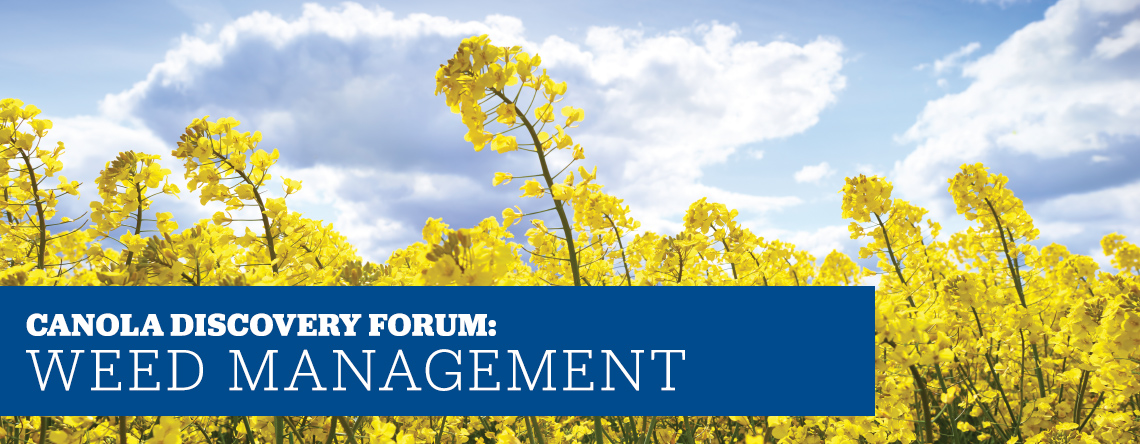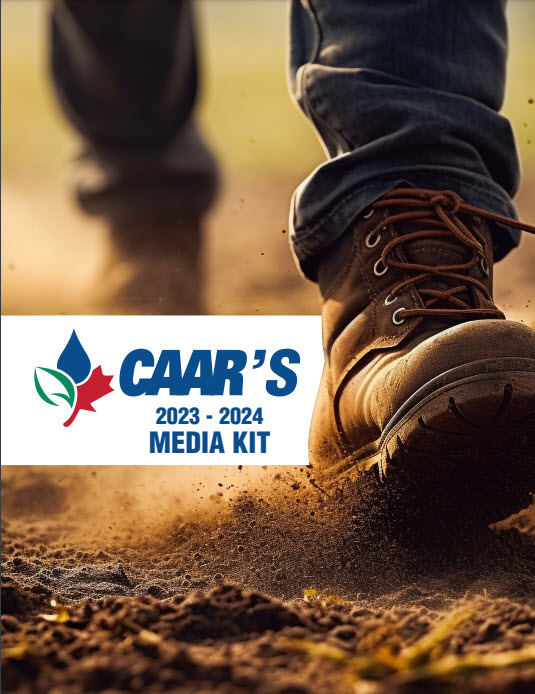The 2019 Canola Discovery Forum hosted by the Manitoba Canola Growers Association in Winnipeg, MB, brought together researchers and industry from throughout the canola value chain to discuss the role Integrated Pest Management (IPM) plays in canola production, and how the Canola Council of Canada (CCC) is working to reach the goal of 52 bu/acre average canola production by 2025.
Read more for some of the highlights on the weed management component of IPM.
Good old-fashioned weed control
The forum opened with three updates on weed, insect and disease management from CCC agronomy specialists. The importance of weed control isn’t a new discussion, and the topic doesn’t often capture headlines the way “exciting” pests like clubroot or blackleg have in recent years.
But while the topic may not be flashy, CCC agronomy specialist Ian Epp focused his update on emphasizing the importance of proactive, solid weed control and using practices to steward the effective weed control options currently available for canola.
“We have really good weed control options in canola, but weed control is still something to think about,” says Epp. “We need to protect that really good weed control that we have. But, we can’t take weed control for granted, a key example is herbicide resistance.”
Read more about herbicide resistance in The Communicator article “A Growing Problem” featuring input from AAFC researcher Hugh Beckie.
Epp’s Top 5 Weed Management Practices:
- Scout
- Spray early
- Manage volunteers
- Good agronomy = good weed management
- Try something new!
Epp says it is important for growers to do something different in their weed management each year. This can be a hard sell, he says, if everything is going well. Growers often want to stick with tried and true strategies; however, he says making proactive changes can go a long way to reducing the potential impacts of herbicide resistance.
“If we don’t change, the weeds will be changing,” he says. “The numbers of herbicide resistant cases we see only go up. Weed control might not be too hard in canola right now, but I think the writing has been on the wall for a while now that it’s about to get a lot more challenging.
“Getting growers engaged and earlier and looking at alternative methods before we see a huge, Australia-like problem will be really key going forward.”
Non-herbicide management options
Epp also touched on some of these alternative methods, including the Harrington Seed Destructor and WEEDit. Both of these machines have been in use in Australia for years and are starting to pop up across the Canadian prairies as growers look for options to battle herbicide resistance.
Read more about non-herbicide weed control methods and what they mean for ag retailers in The Communicator article: New Solutions to an Age Old Problem.
Related Articles
- Training Disruptions CAAR Members please be advised that upgrades to "Training to Do" will disrupt training on June 27 & 28. Upgrades to Training to Do will disrupt access the following days and times. Tuesday, June 27, 7:00 ...
- Saskatchewan Agri-Food Exports Up 75 Per Cent in Q1 The government of Saskatchewan reports that the province's agri-food exports are surging in 2023 to an estimated $6 billion in the first quarter of 2023, up 75 per cent from the same period in 2022. Leading Saskat...
- Stay current on the latest technologies and sustainable practices with ASA virtual event The Sustainable Agronomy Conference will provide Certified Crop Advisers (CCAs), Agri-Sales Professionals, and growers with the opportunity to more fully understand and implement sustainable agronomy in the field. ...
- Field Crops Report for June 2021 According to statistics Canada, the results from the June 2021 Field Crop Survey conducted with 25,000 Canadian farmers showed that farmers planted more canola, barley, soybeans and lentils, but fewer acres of wheat,...
- Virtual ASA Sustainable Agronomy Conference Starts! CAAR members may be interested in attending the US Sustainable Agronomy Conference designed for Certified Crop Advisers (CCAs), Agri-Sales Professionals, and growers which starts today, July 20, 2021. The conferen...
 How to resolve AdBlock issue?
How to resolve AdBlock issue? 


Join the discussion...
You must be logged in as a CAAR member to comment.
Report
My comments